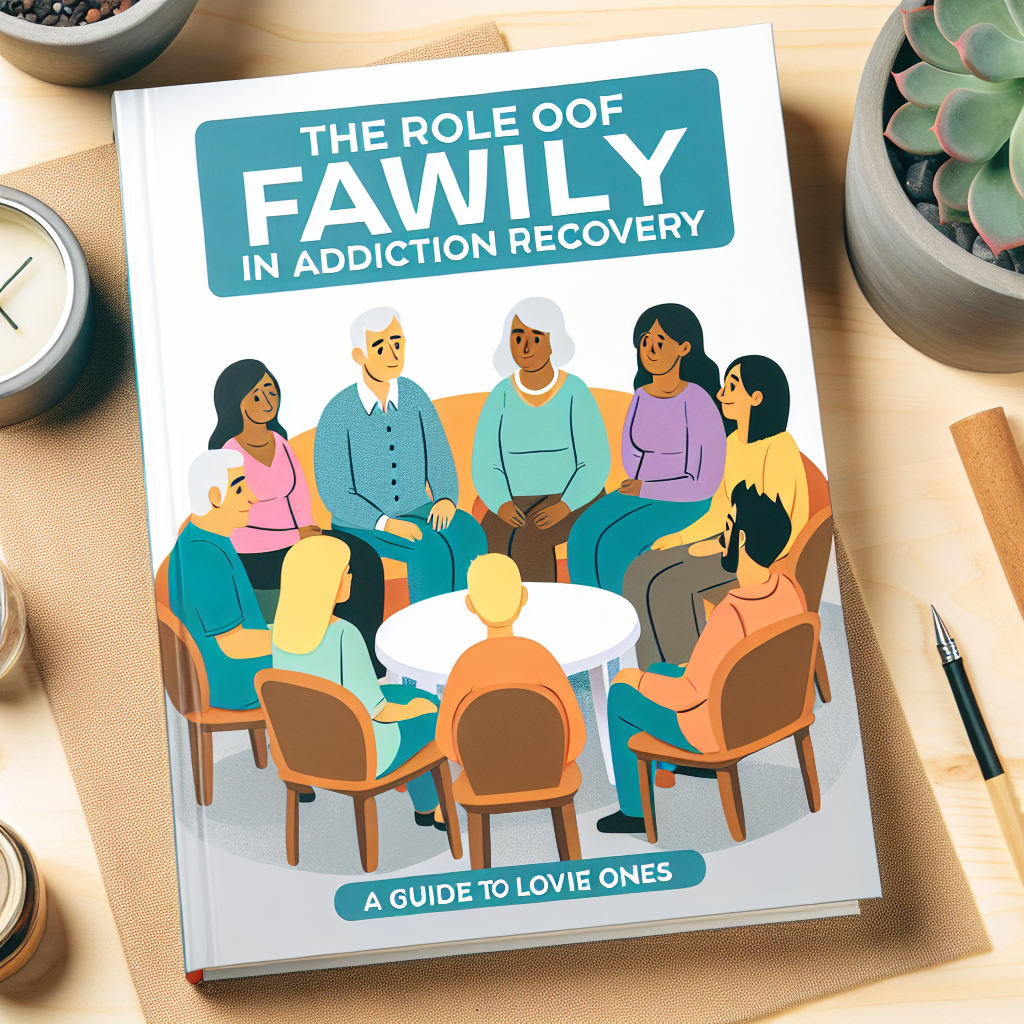-
Table of Contents

“Empowering Families, Transforming Lives: A Guide to Supporting Addiction Recovery”
Introduction
“The Role of Family in Addiction Recovery: A Guide for Loved Ones” explores the critical influence that family members have in the journey of addiction recovery. This guide delves into the multifaceted ways in which familial support can enhance the recovery process, offering practical advice and emotional insights for those supporting a loved one through addiction. It underscores the importance of understanding addiction as a disease, fostering a supportive environment, and engaging in effective communication. By highlighting the roles of empathy, patience, and education, this guide aims to empower families to become a cornerstone of strength and stability in the recovery journey.
Understanding the Impact of Family Support on Addiction Recovery
Understanding the impact of family support on addiction recovery is crucial for anyone navigating the challenging journey of overcoming substance abuse. The role of family in addiction recovery cannot be overstated, as the presence of a supportive network often makes a significant difference in the success of the recovery process. Addiction is a complex and multifaceted issue that affects not only the individual but also their loved ones. Therefore, fostering a supportive and understanding environment is essential for promoting healing and long-term sobriety.
One of the primary ways family support influences addiction recovery is through emotional encouragement. Individuals battling addiction often experience feelings of isolation, shame, and guilt. Having family members who offer unconditional love and understanding can alleviate these negative emotions, providing a sense of belonging and acceptance. This emotional support can be a powerful motivator, encouraging the individual to stay committed to their recovery goals. Moreover, knowing that they are not alone in their struggle can significantly boost their morale and resilience.
In addition to emotional support, practical assistance from family members can also play a pivotal role in the recovery process. This can include helping with daily responsibilities, such as managing household chores, attending therapy sessions, or providing transportation to support group meetings. By alleviating some of the practical burdens, family members enable the individual to focus more on their recovery efforts. Furthermore, family involvement in treatment plans and therapy sessions can enhance the effectiveness of these interventions, as it fosters a collaborative approach to addressing the root causes of addiction.
Another critical aspect of family support in addiction recovery is the establishment of a stable and nurturing home environment. A chaotic or stressful home life can exacerbate the challenges of recovery, potentially leading to relapse. Conversely, a calm and supportive household can provide a safe haven where the individual feels secure and valued. This stability is particularly important during the early stages of recovery when the risk of relapse is highest. Family members can contribute to this stability by maintaining open lines of communication, setting healthy boundaries, and encouraging positive behaviors.
It is also important to recognize that family members themselves may need support and education to effectively assist their loved one in recovery. Addiction can strain family relationships, leading to feelings of frustration, anger, and helplessness. Participating in family therapy or support groups can help family members process their emotions, gain a better understanding of addiction, and learn effective strategies for supporting their loved one. By addressing their own needs and well-being, family members are better equipped to provide the consistent and compassionate support that is vital for recovery.
Furthermore, family support can help reinforce the importance of healthy lifestyle changes that are essential for maintaining sobriety. Encouraging activities such as regular exercise, balanced nutrition, and engaging in hobbies can promote overall well-being and reduce the likelihood of relapse. Family members can also model healthy behaviors and coping mechanisms, demonstrating that it is possible to lead a fulfilling life without relying on substances.
In conclusion, the impact of family support on addiction recovery is profound and multifaceted. Emotional encouragement, practical assistance, a stable home environment, and education for family members all contribute to a supportive network that can significantly enhance the recovery process. By understanding and embracing their role, family members can provide the love, stability, and encouragement needed to help their loved one achieve lasting sobriety. This collaborative effort not only aids in the individual’s recovery but also strengthens family bonds, fostering a healthier and more resilient family unit.
Effective Communication Strategies for Families Supporting a Loved One in Recovery
Effective communication is a cornerstone in the journey of supporting a loved one through addiction recovery. Families play a pivotal role in this process, and understanding how to communicate effectively can make a significant difference in the recovery outcomes. One of the first steps in fostering effective communication is to approach conversations with empathy and without judgment. Addiction is a complex disease, and those struggling with it often feel immense shame and guilt. By creating a safe space where your loved one feels heard and understood, you can help alleviate some of these burdens and encourage open dialogue.
Active listening is another crucial component. This means fully concentrating on what your loved one is saying, rather than thinking about how you will respond. It involves acknowledging their feelings and experiences without interrupting or offering unsolicited advice. Phrases like “I understand that this is difficult for you” or “It sounds like you’re feeling overwhelmed” can validate their emotions and show that you are genuinely engaged in the conversation. This kind of attentive listening can build trust and make your loved one more likely to share their thoughts and feelings with you.
In addition to listening, it’s important to communicate your own feelings and boundaries clearly and respectfully. Use “I” statements to express your concerns without sounding accusatory. For example, instead of saying “You never think about how your actions affect us,” you might say, “I feel worried and hurt when I see you struggling.” This approach reduces defensiveness and opens the door for more constructive conversations. Setting boundaries is also essential for your own well-being and for maintaining a healthy relationship. Be clear about what behaviors are unacceptable and what the consequences will be if those boundaries are crossed.
Moreover, educating yourself about addiction and recovery can enhance your communication efforts. Understanding the nature of addiction, the challenges of recovery, and the potential for relapse can help you approach conversations with greater compassion and insight. This knowledge can also equip you to provide more informed support and to recognize the signs that your loved one may need additional help.
It’s also beneficial to encourage and participate in family therapy or support groups. These settings provide a structured environment where all family members can express their feelings and learn effective communication strategies. Professional guidance can help navigate the complex emotions and dynamics that often accompany addiction recovery. Additionally, support groups offer a sense of community and shared experience, which can be incredibly reassuring and empowering.
While supporting a loved one in recovery, it’s crucial to maintain a balance between offering support and allowing them to take responsibility for their own recovery journey. Encourage them to set their own goals and make their own decisions, while being there to offer support and encouragement. This balance fosters independence and self-efficacy, which are vital for long-term recovery.
Lastly, remember to take care of yourself. Supporting a loved one through addiction recovery can be emotionally draining, and it’s important to ensure that you are also receiving the support you need. Self-care is not selfish; it’s a necessary component of being able to provide sustained support to your loved one.
In conclusion, effective communication involves empathy, active listening, clear expression of feelings and boundaries, education, and professional support. By employing these strategies, families can create a supportive environment that fosters recovery and strengthens relationships. The journey may be challenging, but with patience, understanding, and effective communication, families can play a transformative role in their loved one’s recovery.
Q&A
1. **Question:** What is one key role that family members can play in the addiction recovery process?
**Answer:** Family members can provide emotional support and encouragement, which can significantly enhance the motivation and resilience of the individual in recovery.
2. **Question:** How can family members educate themselves to better support a loved one in addiction recovery?
**Answer:** Family members can attend support groups, seek counseling, and read educational materials to understand addiction and recovery processes, enabling them to offer informed and compassionate support.
Conclusion
The role of family in addiction recovery is crucial, as it provides emotional support, stability, and encouragement to the individual undergoing treatment. Families can help create a conducive environment for recovery by fostering open communication, setting healthy boundaries, and participating in therapy sessions. Their involvement can significantly enhance the effectiveness of treatment programs and reduce the likelihood of relapse. By understanding the complexities of addiction and actively engaging in the recovery process, families can play a pivotal role in their loved one’s journey towards sobriety and long-term wellness.



